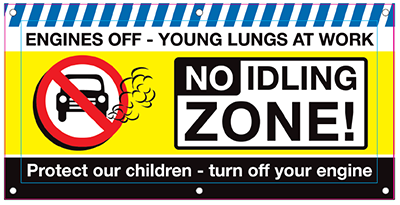Vehicle idling

Vehicle emissions contribute to poor air quality, which is the largest environmental risk to public health in the UK. According to the Royal College of Physicians, air pollution can cause organ damage and is linked to 40,000 premature deaths a year, with car idling being a contributing factor.
Idling vehicles create harmful emissions and this can contribute to many health issues, including asthma, lung disease, heart attacks and cancer.
The pollution from an idling car tends to gather a metre off the ground, so children are particularly vulnerable, which is why It is particularly important to avoid idling near schools, research also shows that exposing children to high levels of air pollution can stunt lung growth, as well as causing behavioural and mental health problems.
What is engine idling?
Engine idling is the running of an engine when it is not required for:
- driving of the vehicle or
- examination of the engine or
- operation of machinery e.g. operation of a tail lift
Vehicles idling while stationary cause unnecessary use of fuel, an increase in emissions, a noisy environment, especially for residents and businesses and is also an offence under the Road Traffic Act.
In modern cars, idling can actually increase wear and tear on the engine as it leads to incomplete fuel combustion and the build up of residues. Idling can cause damage to cylinders and the exhaust system.
By not idling, you reduce the level of harmful emissions being released into the atmosphere and help to make our local environment cleaner and safer for everyone.
Idling engines can cause significant air pollution. An idling engine burns fuel less efficiently and can produce up to twice the emissions of a car that is moving. It pumps out unnecessary sulphur dioxide, particulate matter and nitrogen oxide into the atmosphere.
Idling facts
- Every minute, an idling car produces enough exhaust to fill up to 150 balloons with harmful chemicals, including cyanide, nitrogen oxides (NOx) and tiny particulates called PM2.5.
- An idling engine produces 20 times more pollution than a car travelling at 32mph.
- Research shows that idling for more than 10 seconds uses more fuel and makes more emissions than restarting your engine.
- Car drivers and passengers can be exposed to twice as much air pollution as pedestrians and nine times more than a cyclist.
- Idling can also damage your car engine over time. It can build up carbon in your engine, which makes it work less well and wear out faster.
The law and engine idling
The law says you should not leave your car engine running when you are not moving. Not switching your engine off when asked to do so can lead to a fine of £20, increasing to £40.
Idling: the myths and the truth
Myth: Turning the engine on and off wears it out.
This is not the case in modern cars; electronic ignitions have eliminated this problem.
Myth: Idling reduces wear and tear on the engine, particularly when cold.
Idling creates wear and tear on your engine because fuel does not combust completely, causing damage to engine components such as cylinders, piston rings and the exhaust system.
Myth: Starting and stopping my engine frequently will cause more pollution than just letting it run.
Actually, turning off an engine and then restarting after a minute will cause less pollution than letting it run and also uses less fuel.
Myth: It is better to be inside an idling car than outside.
The air quality inside the car can be twice as bad as outside, and is even worse in Winter, because the emissions don’t dissipate as easily while stationary.
Myth: But I need to keep my battery fully charged, so I have to keep the engine running!
Modern car batteries need less engine running time to stay charged.
Myth: If it's cold outside I need to keep my engine running for it to stay warm.
Your engine will stay warm for 30-60 minutes after switching the engine off. To maintain heat through the fans you can turn the engine off but keep the ignition on.
By switching off your engine, when it’s practical and safe to do so, you’ll help protect your health, save money and reduce air pollution.
Alternatively ditch the car and walk or cycle instead!
Find out more about our ‘engines off’ campaign.
